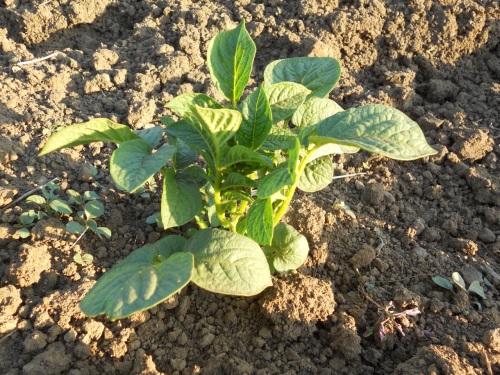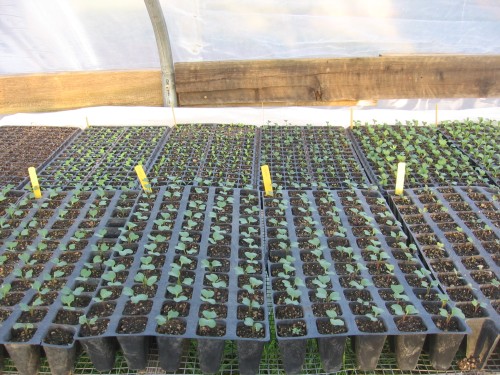Mendocino Organics Vegetable CSA- Tuesday, June 18 2013
In Your Share This Week
- Broccoli
- Beets
- Carrots
- Lettuce
- Scotch Kale
- Swiss Chard
- New Potatoes
This past week has been beautiful spring weather – sunshine, blue skies, afternoon breeze – which is ironic, as Summer officially begins this Thursday. The Summer Solstice is a turning point in the growing season as the days will start to get shorter. This is basically the deadline to get any summer crops in the ground, and time to start planning the fall plantings.
In case you are unfamiliar with new potatoes, just to let you know: these will not keep in storage. You will notice that they have delicate, thin skin, so don’t hold onto them for longer than the other vegetables. While some places recommend not washing them, we gently spray the dirt off of them and let them dry before we pack them. This variety of potato is called Carola, and as a “new potato,” you should find them sweeter and perhaps more buttery than “old potatoes.”
Last night, we tried the potatoes cut up very small and sauteed in oil with chopped up broccoli, carrots, and bacon. You can also simply boil them and enjoy with butter and seasoning.
Here is an easy recipe, loosley adapted from Alice Waters’ Chez Panisse Vegetables (Harper Collins Publishers, 1996):
Kale and Potato Soup
A Portuguese recipe, called caldo verde (green broth) in Portual, where cabbage is often substituted for the kale.
- Kale
- Potatoes
- 2 quarts water
- 1 tsp salt
- Optional: 1 garlic sausage
- Extra virgin olive oil
Cut the kale leaves, without stems, into a chiffonade. Chop the potatoes very fine. Bring the water to a boil with the salt. Add the chopped potatoes, return to a boil, and cook for 2 minutes. Add the kale and cook 2 minutes more. Taste for seasoning. If desired, serve with sliced garlic sausage heated briefly in the soup and a splash of the olive oil.
Note: The proportion of kale to potatoes in this soup is not terribly important. Nor do you need to chop the potatoes; but if you slice them, they will need to cook a little longer before you can add the kale.
Field Notes
It looks like we’re going to harvest our own fava bean seeds to replant. We’re trellising the greenhouse cucumbers and should have some to harvest soon. We’re wrapping up summer planting, and everything looks good. We’re preparing to start fall planting, so we’ll be assessing our seed inventory.
When we’re trying to grow food for most of the year, we have to stay on top of our planting schedule. Each season is unique and has its challenges. For the fall harvest, most of the crops are cool weather crops, and it’s not very cool in the summer time when we’re trying to grow them. So we grow a diversity of crops to hedge the risk if something does not grow well.
We’re still taking sign-ups for the Fall Vegetable CSA Season. It’s for the 6 weeks following the Main Season (4 weeks in November, 2 in December), and it’s $120. Let us know if you’re interested and haven’t signed up already!
Eat well,
Adam & Paula






























